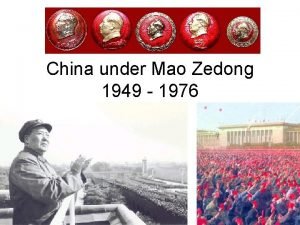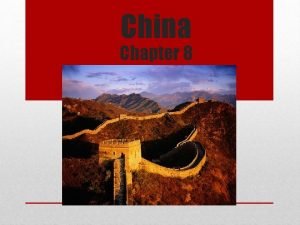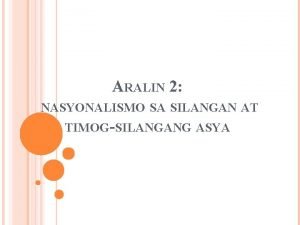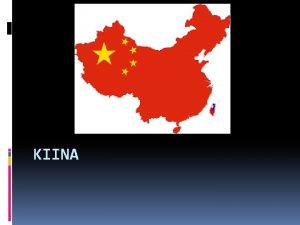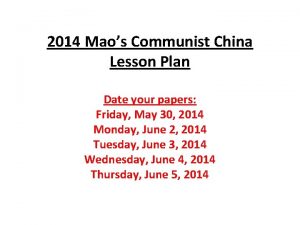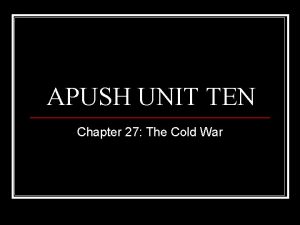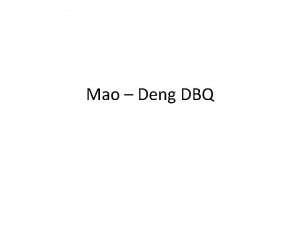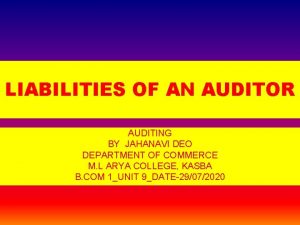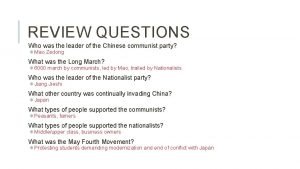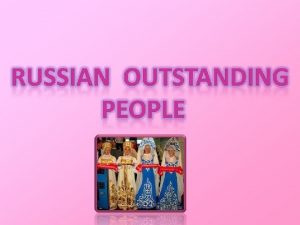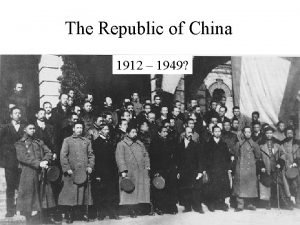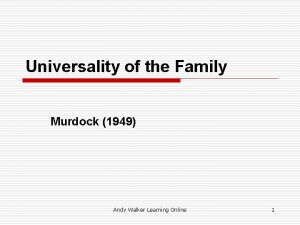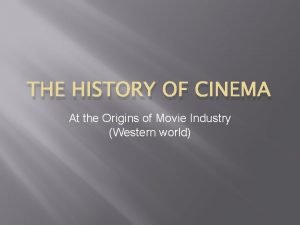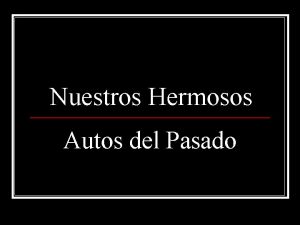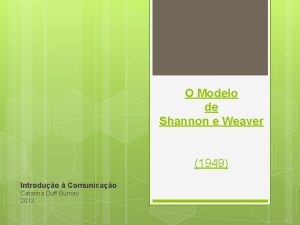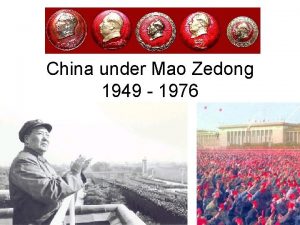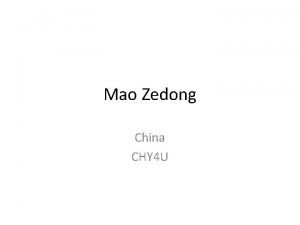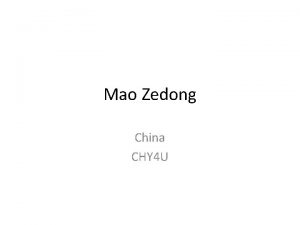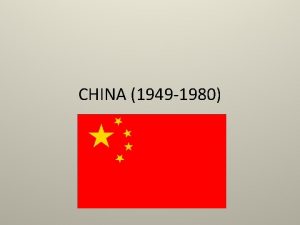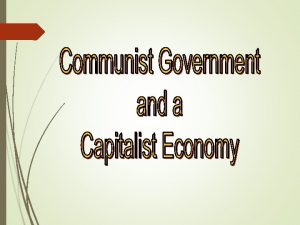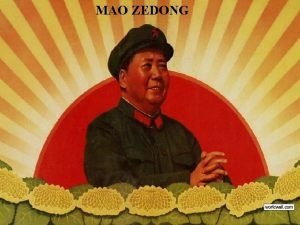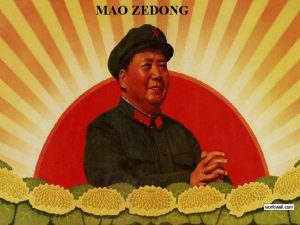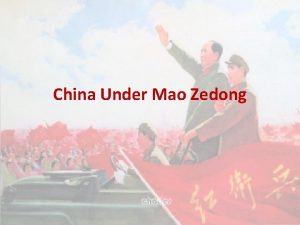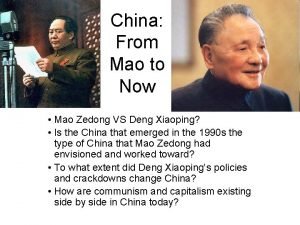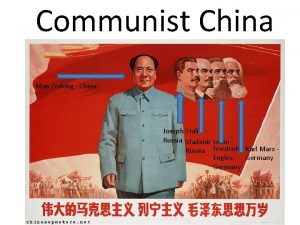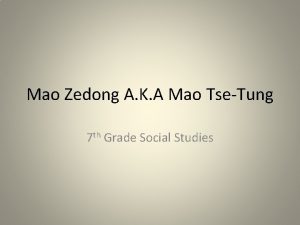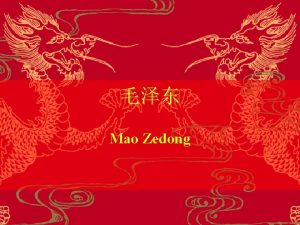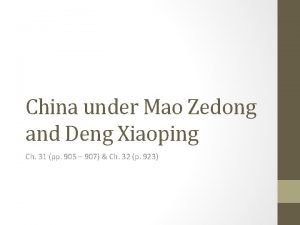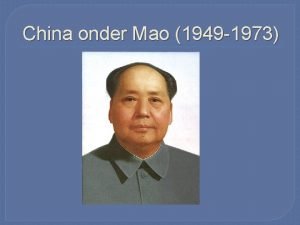China under Mao Zedong 1949 1976 Outline GMDCCP




















- Slides: 20

China under Mao Zedong 1949 - 1976

Outline • • • GMD-CCP Civil War (1946 -1949) Recovery and Socialism (1949 -1956) Rethinking the Soviet model (1956 -1957) Great Leap Forward (1958 -1961) Recovery & growing elite division (1962 -5) Great Proletarian Cultural Revolution (1966 -1976)

WW 2 in China 1937 -1945

Civil War (1946 – 1949) • GMD: Guomindang (Nationalist Party) – Chiang Kai-shek (President) • CCP: Chinese Communist Party – Mao Zedong

“War of Liberation”

Mao Zedong • A revolution to remove “ 3 big mountains” – imperialism – feudalism – bureaucrat-capitalism • A “United Front” of … – workers – peasants – petty bourgeoisie and national bourgeoisie

People’s Republic of China • 1949 -10 -01, PRC, Beijing • Chairman: Mao Zedong • 5 -Star Red Flag • Republic of China government retreated to Taiwan

Economic Reconstruction 1950 s • • Soviet Union model and assistance land reform (eliminate landlord class) heavy industry (state-owned enterprises) First National People’s Congress (1954) – PRC Constitution • Zhou Enlai – Premier – Foreign Minister

Great Leap Forward (19581960) • abandon the Soviet model of economic development – Soviet “scientific planning” • mass mobilization • people’s communes

Great Leap Forward (19581960) • unrealistic output targets – industry – agricultural and human disaster

Growing Division (1962 -1965) • Mao Zedong vs. Liu Shaoqi and Deng Xiaoping • charismatic leadership vs. bureaucracy

Cultural Revolution (1966 -1976) • Great Proletarian Cultural Revolution – commitment to revolution and “class struggle” – power struggle to succeed Mao • Phase I: the rise and fall of “red guards” • Phase II: the rise and fall of Lin Biao • Phase III: the rise and fall of the “Gang of Four”

Phase I: Red Guards (1966 -69)

Phase I: Red Guards (1966 -69) • Purge of party cadres – Liu Shaoqi and Deng Xiaoping • Purge of intellectuals

Phase II: Lin Biao (1969 -71) • the putative successor to Mao Zedong – the cult of personality around Mao • In 1971 Lin allegedly tried but failed – to assassinate Mao – to flee to Soviet Union (“ 9. 13”) • “ 9. 13” eroded the credibility – of the entire leadership – of the Cultural Revolution

Phase III: the “Gang of Four” • 1972 – 1976 • power struggle between – the radical “Gang of Four”, led by Jiang Qing, Mao’s wife – the “moderates”, led by Premier Zhou Enlai • the fate of Deng Xiaoping

Diplomatic Breakthrough • 1971, PRC became the representative of China in UN (replaced ROC)

Diplomatic Breakthrough • 1972, President Nixon visited Beijing

Mao and Zhou Died in 1976 • Turning point in China’s postwar era • “Gang of Four” were arrested • End of the Cultural Revolution

Reforms and Opening up • The 3 rd Plenum of the 11 th CCP Central Committee in 1978 – Deng Xiaoping’s ascendancy – economic modernization became focus • US-PRC diplomatic relations in 1979
 Mao zedong outline
Mao zedong outline Sun yat sen and mao zedong
Sun yat sen and mao zedong Silangang asya nasyonalismo
Silangang asya nasyonalismo Tiananmenin verilöyly
Tiananmenin verilöyly Mao zedong lesson plan
Mao zedong lesson plan Nuremberg trials apush
Nuremberg trials apush Mao zedong vs deng xiaoping
Mao zedong vs deng xiaoping Guerra civil china 1949
Guerra civil china 1949 Criminal liabilities of an auditor
Criminal liabilities of an auditor Mao mao
Mao mao When did mao take over china
When did mao take over china When did mao take over china
When did mao take over china Alla pugacheva was born in 1949 in moscow
Alla pugacheva was born in 1949 in moscow Republic of china (1912)
Republic of china (1912) Ang wika ay sistema ng mga sagisag na binubuo ng mga tunog
Ang wika ay sistema ng mga sagisag na binubuo ng mga tunog Murdock 1949 family
Murdock 1949 family The ten commandments 1956
The ten commandments 1956 1949 cadillac series 62 4 door
1949 cadillac series 62 4 door Equity charitable trust
Equity charitable trust Modelo de shannon
Modelo de shannon Plan marshall affiche
Plan marshall affiche
